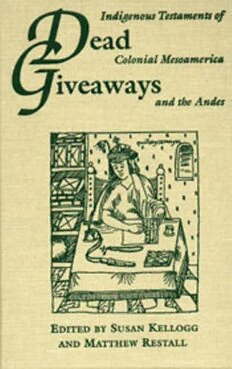
Dead giveaways: indigenous testaments of colonial Mesoamerica and the Andes PDF
01998·0.858 MB·English
Most books are stored in the elastic cloud where traffic is expensive. For this reason, we have a limit on daily download.
Preview Dead giveaways: indigenous testaments of colonial Mesoamerica and the Andes
Description:
Last wills and testaments comprise at least half of the surviving documents written in indigenous languages during the Spanish colonial period. Both men and women, mortally ill, probably bedridden, participated in the custom as they summoned family members, close friends, perhaps business associates, and the notary, who actually wrote the dictated final statement. Whether in Nahuatl or Spanish, Mixtec or Maya, whether in the dry flatlands of the Yucatan peninsula or the west valleys of the Quito highlands, the ritual opened in the same way--"In the name of the Father, the Son, and the Holy Spirit"--and the ill and dying went on to dispose of their worldly goods. The lists of material items sandwiched between religious and legal formulas lends these documents a straightforward and mundane appearance; however, the essays collected here demonstrate in varied and exciting ways their importance as rich ethnohistorical sources. In addition to providing information on families, gender roles, property holdings, institutional structures, social and familial relationships, and religious beliefs and practices, the wills for a given region provide evidence for understanding cultural change over time. The ten contributions to this volume, which are devoted to the description and analysis of wills, aim at wide geographic and chronological coverage, exploring a region from Central Mexico to Bolivia and spanning the period from the mid-sixteenth to the early-nineteenth centuries. Available for the first time, this comprehensive primary-source material gives individual voice to peoples often either ignored or treated only as collective entities, especially the "Maya," or the "Inca."
See more
The list of books you might like
Most books are stored in the elastic cloud where traffic is expensive. For this reason, we have a limit on daily download.
